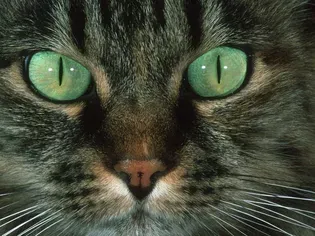Why Do Cats Lose Whiskers?
Updated on 04/26/24

Why Do Cats Lose Whiskers?
As cat owners, we're all familiar with our feline friends' adorable whiskers. These long, thin hairs are not just a charming feature; they play a crucial role in a cat's sensory perception and overall well-being. However, it's not uncommon for cats to lose whiskers from time to time. While this can be a bit alarming, it's usually not a cause for concern. In this article, we'll delve into the reasons why cats lose whiskers and explore the implications for their health and behavior.
Natural Shedding
One of the most common reasons for whisker loss is natural shedding. Just like humans shed hair, cats shed their whiskers as part of their regular grooming process. This shedding typically occurs gradually, with one or two whiskers falling out at a time. The new whiskers will start to grow back almost immediately, so you may not even notice that your cat has lost a few.
Injury or Trauma
Another reason for whisker loss is injury or trauma. If a cat's whiskers are pulled, cut, or damaged in any way, they may fall out prematurely. This can happen during a fight with another animal, during play, or even during a grooming session. If you notice that your cat has lost a whisker or two suddenly, it's worth checking for any signs of injury. If you find any wounds or swelling, it's important to take your cat to the vet for treatment.
Medical Conditions
In some cases, whisker loss can be a sign of an underlying medical condition. Certain skin conditions, such as ringworm or mange, can cause the whiskers to become brittle and break off. Hormonal imbalances, such as Cushing's disease, can also lead to whisker loss. If you notice that your cat is losing whiskers excessively or if the whiskers are accompanied by other symptoms, such as skin irritation or lethargy, it's important to take your cat to the vet for a checkup.
Signs of Stress
Whiskers are highly sensitive, and they can be affected by stress. If a cat is feeling stressed or anxious, it may start to groom itself excessively, which can lead to whisker loss. Other signs of stress in cats include changes in appetite, litter box habits, and activity level. If you think your cat may be stressed, there are a few things you can do to help, such as providing a safe and comfortable environment, offering plenty of playtime, and using pheromone diffusers or sprays.
Implications for Health and Behavior
While whisker loss is usually not a cause for concern, it can have some implications for your cat's health and behavior. Whiskers are essential for a cat's sense of balance and spatial awareness. They help cats navigate their environment, avoid obstacles, and judge distances. Without whiskers, cats may be more hesitant to jump or climb, and they may be more likely to bump into things.
Whiskers also play a role in a cat's social interactions. Cats use their whiskers to communicate with each other, and they may also use them to assess potential threats. If a cat's whiskers are damaged or missing, it may have difficulty communicating with other cats and may be more likely to feel anxious or stressed in social situations.
Conclusion
Whiskers are an important part of a cat's anatomy, and they play a vital role in their sensory perception and overall well-being. While it's normal for cats to lose whiskers from time to time, excessive or sudden whisker loss can be a sign of an underlying medical condition or stress. If you're concerned about your cat's whisker loss, it's always best to consult with your veterinarian for a proper diagnosis and treatment plan.
Explore More Pets

Cat Behavior Problems
How to Stop Aggression in Kittens

Long-Haired Cat Breeds
Siberian Cat: Breed Profile, Characteristics, & Care

Cat Behavior Problems
How to Stop Kittens From Scratching and Biting

Long-Haired Cat Breeds
Turkish Angora: Cat Breed Profile, Characteristics & Care

Basic Training
How to Socialize Your Kitten

Short-Haired Cat Breeds
Cute Pictures & Facts About Calico Cats & Kittens

Litter Box Training
Training Your Kitten to Use the Litter Box

Long-Haired Cat Breeds
10 Fun Facts About White Cats